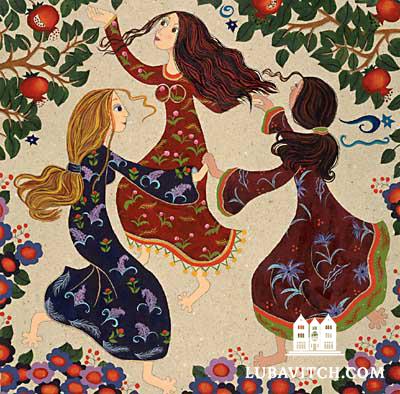(lubavitch.com) The festivities of Simchas Torah, one of the happiest days on the Jewish calendar, begin Monday night. In communities around the world, people will celebrate the completion and subsequent resumption of the Torah cycle, by literally giving the Torah feet and dancing it around the synagogue.
While this holiday is often considered a man’s celebration, many Chabad synagogues are going out of their way to prove otherwise.
“It is important for women to feel the joy of this day and to be able to express it,” asserts Lanie Boris M.ED. Boris, who is a life coach and educational consultant in Las Vegas, encourages the women in her community to let loose a little. “The men are having such a great time on their side of the mechitzah,” she says, “women should also celebrate within the bounds of modesty.”
Chabad of Summerlin, where Boris and her family pray, hosts a rollicking Simchas Torah party for over 200 Las Vegans.
“To be honest,” Boris laughs, “this is truly a hot button issue for me. Sometimes, women need a little extra push to get up and dance. I encourage the young girls to teach the latest moves and I try to persuade the women to make a l’chaim together and dance with joy. The happiness we feel dancing is similar to that of a wedding.”
“The happiness of Simchas Torah is for everyone: men, women and children,” says Rabbi Yisroel Schanowitz, director of Chabad of Summerlin. “When Hashem originally gave the Torah to the Jewish people,” he explains, “he commanded Moses to first present it to the women, and only after to the men.”
In his community, says Schanowitz, “the women play a large role.” On Simchas Torah itself, they “participate in the traditional auctions and dancing.” Their joy, he believes, “is awesome.”
“Since the Torah was first given,” says Baila Brackman of Chabad of Hyde Park, Illinois, “women have had a special connection to it.” Brackman, who is neighbors with presidential candidate, Barack Obama, tries to make the women in her ultra-liberal neighborhood “feel like they are part of all of the excitement.”
Last week, a contingent of local women celebrated the holiday of Sukkos with a sukkah party. After discussing a particularly apropos topic, “joy in turbulent times,” the women learned how to create gourmet vegan dishes. Of course, says Brackman, the evening was rounded out by festive singing.
On Tuesday night, community members and students from the University of Chicago will congregate at the Chabad center for more singing and dancing. “The female students do everything with us here,” says Brackman. “A highlight of the evening is when the students sing popular Jewish songs together in rotation. And the women certainly join in.”
Women and men, on separate sides of the mechitzah, danced the night away at another Sukkos party on the campus of Penn State University last week. “No one complains about the separation,” says director Rabbi Nosson Meretsky.
“We clarify to the students that the reason for celebrating this holiday is to share the Torah’s joy, not as a guy-meets-girl event.” The Meretskys have seen, during their eight years on campus, that the students actually prefer the separate dancing.
“Many students come to campus with preconceived notions about a woman’s place in traditional Judaism,” explains Meretsky. “It is crucial at this stage, when they are exploring who they are and still developing as unique individuals, to show them how a woman really fits in.” Sarah Meretsky hosts women’s events throughout the year, including a women’s cabaret night and classes tailored to female students.
Penn State students are looking forward to Tuesday night’s big party. Meretsky is expecting an especially large crowd, as the holiday is not competing with a football game this year. The revelry will last well into the night, as students bring the party to the various Jewish fraternities on campus.
It is the undiluted happiness of the day, says Brackman, which serves to unite everyone, male and female. But it is the women, explains Schanowitz, who lead the Jewish nation in pure faith and joy. Biblical commentaries suggest that the prophetess Miriam and other women possessed a greater belief in G-d’s miracles before crossing the Red Sea. They left Egypt with tambourines, anticipating salvation, and later used them on the opposite shore.
Boris too, is passionate about the power of women to effect change. “There is so much we can achieve,” she says.
“There are many avenues we can traverse in order to fulfill our unique role. It just takes a little extra effort to make the experience truly fulfilling.”

Be the first to write a comment.